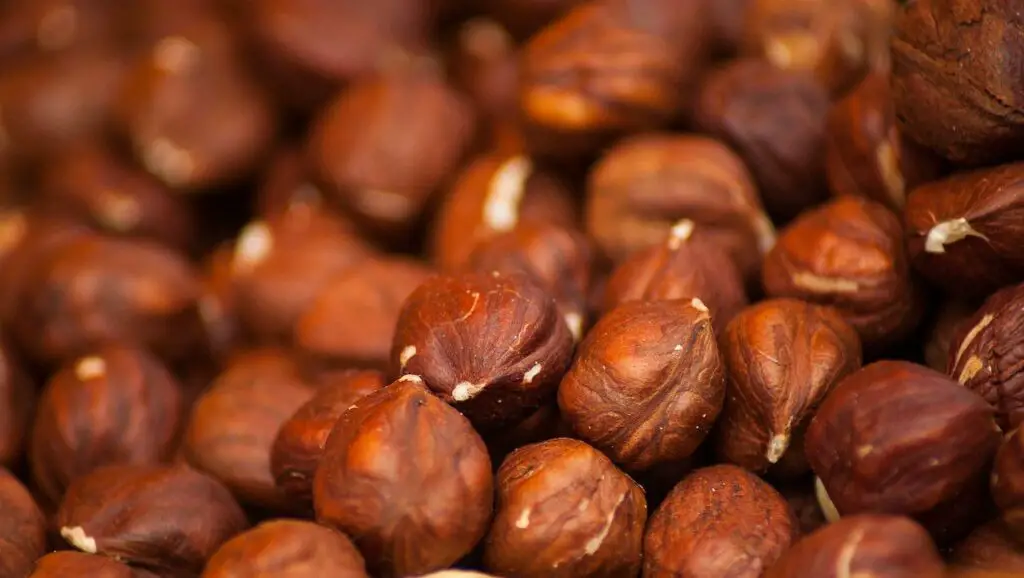Raw, roasted, or dipped in chocolate, you must admit hazelnuts are one of the healthiest and tastiest nuts.
You cannot resist the urge to throw your furry friend a handful of the tasty nuts.
Before you do that, let’s find out if it’s safe to give your dog hazelnuts.
So, can dogs eat hazelnuts?
No.
Hazelnuts may not be toxic but are dangerous to your dog when a lot is ingested.
Hazelnuts are also a choking hazard and can further obstruct your dog’s digestive system.
There is no need to panic if your dog has had a few but keep an eye out for symptoms like choking or digestive distress.
Let’s dig deeper into why hazelnuts are not the best option of treats to feed your dog, what to look out for, and healthier alternatives to give your furry friend and have your mind at peace.

Why you should not feed hazelnuts to your dog
Hazelnuts are nutritious to humans.
They contain protein, phosphorus and fatty acids.
With the risks involved to dogs, it is best to source for the dog these nutrients from safer foods like meats and vegetables.
The risks of feeding your dog hazelnuts are more than any possible benefits.
Here are some of the negative outcomes of feeding your pet hazelnuts:
Hazelnuts are a choking hazard
These nuts are small, round, hard, and can easily get lodged into your dog’s throat, causing choking.
Signs that your dog is choking include
- Gagging
- Retching
- Drooling
- Distress
- Coughing
- Pawing at the mouth
If your dog is choking and you notice these symptoms, try to remove the nut if it’s visible.
If not, don’t poke your finger in the mouth.
Instead, call the vet, who will direct you on the Heimlich maneuver to remove the hazelnut or CPR before rushing the pup to the vet or before help arrives.
Hazelnuts can cause intestinal obstruction
Due to the physical form of the hazelnuts, some dogs might find it difficult to chew the nuts and end up swallowing them whole, leading to intestinal blockage.
Pups are especially prone to blockage due to their tiny intestines.
Here are some signs of when you suspect your pup has an intestinal blockage.
When you identify them, call your vet.
- Abdominal pain
- Bloating
- burping
- Unable to poop
- Loss of appetite
- Constipation
- Diarrhea
- Vomiting
- Drooling
- weakness
Hazelnuts are too salty for dogs
Hazelnuts, especially those purchased at the store, contain salt and spices that can cause your furry friend digestive distress.
Excess salt is not good for your dog and can cause sodium poisoning and kidney failure.
Signs to look out for include;
- Electrolyte imbalance
- Dehydration
- Seizures
- Dry mouth
- Sunken eyes
- Lethargy
- Vomiting
- Weakness
- Tremors
Hazelnuts are too fatty
Hazelnuts are extremely rich in fats, with every 100g containing 61g of fat.
Too much fat can cause obesity and pancreatitis in dogs.
The fats add extra weight which lowers your dog’s energy levels.
Obesity can also cause muscle pain and diabetes.
Too much fat, whether taken in one sitting or over some time, can cause pancreatitis, which can be fatal.
Symptoms to look out for include;
- Diarrhea
- Lethargy
- Chronic vomiting
- Body weakness
- Bloating
- Tender and painful tummy
- Loss of appetite
- Dehydration
- Fever

Safer alternatives to hazelnuts
Peanuts: peanuts are a great source of protein and are safe to give your dog.
They are identified as nuts, but peanuts are legumes as they grow underground.
Cashew Nuts: you can feed your dog shelled cashew nuts in moderation as they are soft and do not pose a choking hazard.
Avoid store packaged cashew nuts due to the high salt content.
Sample homemade peanut recipe for your dog
Ingredients
- 500g roasted peanuts
- Two tablespoons of coconut oil or olive oil
Optional
One tablespoon of organic honey
Instructions
Put all the ingredients in a food processor and mix thoroughly.
Storage instructions
Store in a jar in a cool, dry place for two weeks.
You can give your dog the peanut butter as it is.
Dogs love peanut butter. Avoid the store peanut butter as it may contain xylitol, a sweetener harmful to dogs.
If you must buy peanut butter, ensure that the ingredients are dog-friendly.
Alternatively, you can mix half a cup of peanut butter, two cups of flour, two eggs, and a quarter cup of water.
Make a dough, roll it out, and cut it to desired shapes.
Bake at 350 degrees Fahrenheit for 15 minutes and you’ll have a delicious treat for your dog.
Frequently asked questions
Are all nuts dangerous to dogs?
Not all nuts are dangerous to your dog.
Your dog can enjoy peanuts and cashew nuts in moderation.
You can use these nuts in doggy food recipes.
Which other nuts are dangerous to dogs?
Dogs are allergic to macadamia as they cause body weakness, diarrhea, and vomiting.
Pistachios and pecans contain aflatoxin, which is poisonous.
Dogs cannot digest the protein in almonds, and walnuts contain fungi that cause vomiting and seizures.
Can you feed your dog nutshells?
Nutshells are a choking hazard to dogs and can also cause injuries to the mouth and digestive system, depending on how hard they are.
Another risk is intestinal blockage leaving your fur buddy in distress.
Are processed and coated nuts safe for dogs?
No.
Processed nuts may contain hazardous components harmful to your dog.
The additives in coated and processed nuts include onion and garlic powder which are toxic.
Xylitol, a sweetener commonly used, is also poisonous to dogs.
The fat and salt contents are also high and harmful to dogs.
Conclusion
It comes naturally, wanting the best for your furry friend.
You will not think twice about providing the best that you also enjoy.
You have to be careful to ensure you feed your pup dog-friendly and healthy treats.
Some treats like hazelnuts may not be toxic but the risk presented by feeding them to your dog far outweighs the benefits.
When in doubt, always check in with your vet for safe advice on what to feed your fur buddy.
- What Dog Breeds Have Pink Skin? - March 24, 2023
- What Are the Most Inspiring Dog Breeding Quotes? - March 20, 2023
- Can Pheromone Spray Help Improve Dog Breeding Results? - March 19, 2023








